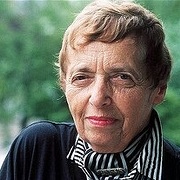Gitta Sereny (1921–2012)
Author of Albert Speer: His Battle with Truth
About the Author
Her previous books include Into That Darkness, Albert Speer: His Battle with Truth & most recently Cries Unheard. Born in Vienna, she lives in London. (Bowker Author Biography)
Works by Gitta Sereny
Associated Works
Tagged
Common Knowledge
- Birthdate
- 1921-03-21
- Date of death
- 2012-06-14
- Gender
- female
- Nationality
- Austria (birth)
UK - Country (for map)
- Austria
- Birthplace
- Vienna, Austria
- Place of death
- Cambridge, Cambridgeshire, England, UK
- Places of residence
- Vienna, Austria
Paris, France
London, England, UK - Education
- Stonar House, Sandwich, Kent, England, U.K.
Realgymnasium and Lyzeum Luithlen, Vienna, Austria
Max-Reinhardt-Seminar, Vienna, Austria
Sorbonne, Paris, France - Occupations
- journalist
historian
biographer - Relationships
- von Mises, Ludwig (stepfather)
Honeyman, Don (husband) - Organizations
- United Nations Relief and Rehabilitation Administration (UNRRA)
- Awards and honors
- The Duff Cooper Prize (1995)
Stig Dagerman Prize (2002)
Commander of the Order of the British Empire (2004) - Short biography
- Gitta Sereny was born in Vienna to an aristocratic Hungarian-German family. As an 11-year-old schoolgirl, she heard Hitler speak at one of the Nazi Nuremberg rallies. She was educated in England and Vienna, where she studied at the drama school founded by director Max Reinhardt. After the Nazi takeover of Austria in 1938, she moved to France, where she worked as a volunteer nurse with orphans and participated in the French Resistance, until she had to flee the country when the Germans occupied it. After World War II, she was a welfare worker with displaced persons before becaming a journalist, and gained fame for a book about Albert Speer. In 1948, she married photographic journalist Don Honeyman and moved with him to London, where they raised their two children. Gitta Sereny wrote investigative articles for newspapers and magazines as well as books. Her subjects included the trials of Nazi concentration camp personnel and young child murderer Mary Bell.
Members
Reviews
Lists
Awards
You May Also Like
Associated Authors
Statistics
- Works
- 8
- Also by
- 1
- Members
- 2,364
- Popularity
- #10,857
- Rating
- 4.0
- Reviews
- 49
- ISBNs
- 101
- Languages
- 13
- Favorited
- 6


















